President for life
President for life is a title assumed by or granted to some leaders to remove their term limit irrevocably as a way of removing future challenges to their authority and legitimacy. The title sometimes confers on the holder the right to nominate or appoint a successor. The usage of the title of "president for life" rather than a traditionally autocratic title, such as that of a monarch, implies the subversion of liberal democracy by the titleholder (although republics need not be democratic per se). Indeed, sometimes a president for life can proceed to establish a self-proclaimed monarchy, such as Jean-Jacques Dessalines and Henry Christophe in Haiti.
Similarity to a monarch
A president for life may be regarded as a de facto monarch. In fact, other than the title, political scientists often face difficulties in differentiating a state ruled by a president for life (especially one who inherits the job from a family dictatorship) and a monarchy.
Most leaders who have proclaimed themselves president for life have not in fact gone on to successfully serve a life term. Most have been deposed long before their death while others truly fulfill their title by being assassinated while in office. However, some, such as José Gaspar Rodríguez de Francia, Alexandre Pétion, Rafael Carrera, François Duvalier, Josip Broz Tito and Saparmurat Niyazov, have managed to rule until their (natural) deaths. Others made unsuccessful attempts to have themselves named president for life, such as Mobutu Sese Seko in 1972.[1]
Most notable
Julius Caesar
One of the most well-known incidents of a republican leader extending his term indefinitely was Roman dictator Julius Caesar, who made himself "Perpetual Dictator" in 45 BC. Traditionally, the office of dictator could only be held for six months, and although he was not the first Roman dictator to be given the office with no term limit, it was Caesar's dictatorship that inspired the string of Roman emperors who ruled after his assassination.
Napoleon Bonaparte
Caesar's actions would later be copied by the French Consul Napoleon Bonaparte, who was appointed "First Consul for life" in 1802 before elevating himself to the rank of Emperor two years later. Since then, many dictators have adopted similar titles, either on their own authority or having it granted to them by rubber stamp legislatures.
China
According to the current Constitution of the People's Republic of China, the President and Vice President must be a Chinese citizen with full electoral rights who has reached the age of 45. The President's term of office is the same as the term of the National People's Congress (currently five years), and the president and vice-president were both limited to two consecutive terms.[2]
Such limit was abolished by the Central Committee of the Communist Party of China to the 13th National People's Congress on 25 February 2018, making it possible for the President and the Vice President to service the office for life.[3][4]
According to the British Financial Times, China's leader Xi Jinping expressed his views of constitutional amendment at meetings with Chinese officials and foreign dignitaries. Xi explained the decision in terms of needing to align his two more powerful posts — General Secretary of the Communist Party and Chairman of the Central Military Commission (CMC) which are no term limits.[5] However, Xi did not say whether he intended to serve as party general secretary, CMC chairman and state president, for three or more terms.
North Korea
After Kim Il-sung's death in 1994, the North Korean government wrote the presidential office out of the constitution, declaring him "Eternal President" in 1998 in order to honor his memory forever. Since there can be no succession in a system where the President reigns over a nation beyond death, the powers of the president are nominally and effectively split between the president of the Supreme People's Assembly, the prime minister, and the chairman of the State Affairs Commission. However, his son and grandson have been in control of the country since his death (Kim Jong-il from 1994 until his death in 2011, and Kim Jong-un since 2011).
List of leaders who became president for life
Note: the first date listed in each entry is the date of proclamation of their status as President for Life.
| Portrait | Name | Title | Took office | Left office | Notes |
|---|---|---|---|---|---|
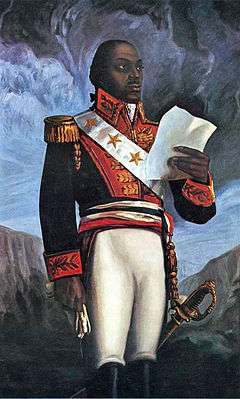 | Toussaint Louverture | Governor for Life of Saint-Domingue | 1801 | 1802 | arrested and exiled to metropolitan France 1802, died 1803. |
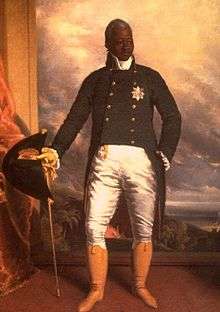 | Henri Christophe | President for Life of the State of Haiti (Northern) | 1807 | 1811 | became King 1811, committed suicide in office 1820. |
.jpg) |
Alexandre Pétion | President for Life of Haiti (Southern) | 1816 | 1818 | died in office 1818. |
| José Gaspar Rodríguez de Francia | Perpetual Supreme Dictator of Paraguay | 1816 | 1840 | died in office 1840. | |
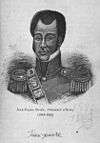 | Jean-Pierre Boyer | President for Life of Haiti | 1818 | 1843 | became President for Life immediately upon assuming the office because Alexandre Pétion's constitution provided for a life presidency for all his successors, deposed 1843, died 1850. |
 | Antonio López de Santa Anna | President for Life of Mexico | 1853 | 1855 | resigned 1855, died 1876. |
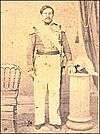 | Rafael Carrera | President for Life of Guatemala | 1854 | 1865 | died in office 1865. |
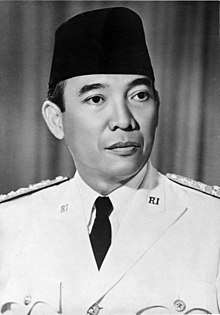 | Sukarno | Supreme Commander, Great Leader of Revolution, Mandatory of the People's Consultative Assembly, and President for Life of Indonesia | 1963 | 1966 | appointed as President for Life according to the Ketetapan MPRS No. III/MPRS/1963,[6] stripped of title 1966, deposed 1967, died under house arrest 1970. |
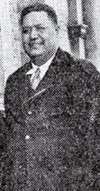 | Tupua Tamasese Meaʻole | O le Ao o le Malo for Life of Samoa | 1962 | 1963 | Died in office 1963, elected to serve alongside Tanumafili II (see below).[7] |
| Malietoa Tanumafili II | O le Ao o le Malo for Life of Samoa | 1962 | 2007 | Died in office 2007, elected to serve alongside Meaʻole (see above).[7] | |
.jpg) | François "Papa Doc" Duvalier | President for Life of Haiti | 1964 | 1971 | died in office 1971, named his son as his successor (see below).[8] |
.jpg) | Jean-Claude "Baby Doc" Duvalier | President for Life of Haiti | 1971 | 1986 | named by his father as successor (see above), deposed 1986, died 2014. |
 | Hastings Banda | President for Life of Malawi | 1971 | 1993 | stripped of title after 1993 referendum, defeated in 1994 general election, died 1997. |
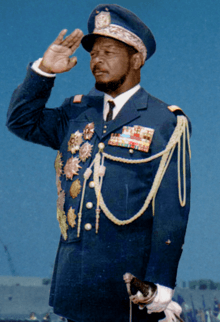 | Jean-Bédel Bokassa | President for Life of the Central African Republic | 1972 | 1976 | became Emperor 1976, deposed 1979, died 1996. |
| Francisco Macías Nguema | President for Life of Equatorial Guinea | 1972 | 1979 | deposed and executed 1979. | |
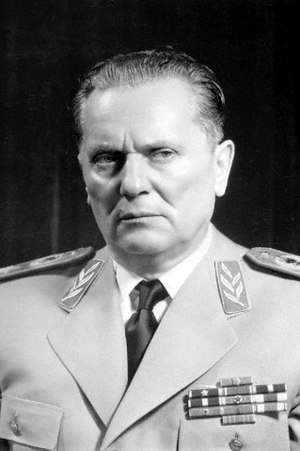 | Josip Broz Tito | President for Life of Yugoslavia | 1974 | 1980 | appointed as President for Life according to the 1974 Constitution, died in office 1980. |
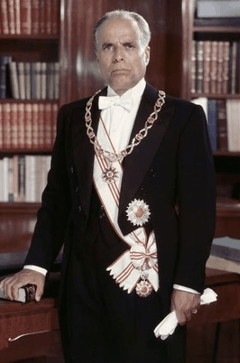 | Habib Bourguiba | President for Life of Tunisia | 1975 | 1987 | deposed 1987, died under house arrest 2000. |
%2C_R23930288.jpg) | Idi Amin of Uganda | President for Life of Uganda | 1976 | 1979 | defeated in war 1979, died 2003. |
| Lennox Sebe | President for Life of Ciskei | 1983 | 1990 | deposed 1990, died 1994. | |
 | Saparmurat Niyazov | President for Life of Turkmenistan | 1999 | 2006 | died in office 2006. |
Notes
- ↑ Crawford Young and Thomas Turner, The Rise and Decline of the Zairian State, p. 211
- ↑ Constitution of the People's Republic of China, Section 2, Article 79.
- ↑ "CPC proposes change on Chinese president's term in Constitution - Xinhua | English.news.cn". www.xinhuanet.com. Retrieved 2018-02-25.
- ↑ Reuters (2018-02-25). "China Sets Stage for Xi to Stay in Office Indefinitely". The New York Times. ISSN 0362-4331. Retrieved 2018-02-25.
- ↑ Mitchell, Tom. "China's Xi Jinping says he is opposed to life-long rule". Financial Times. Retrieved 17 April 2018.
President insists term extension is necessary to align government and party posts
- ↑ "Ketetapan MPRS No. III/MPRS/1963".
- 1 2 "Constitution of the Independent State of Western Samoa 1960". University of the South Pacific. Archived from the original on 8 July 2007. Retrieved 28 December 2007.
- ↑ The Oxford Encyclopedia of African Thought: Abol-impe. Oxford University Press. 2010-01-01. p. 328. ISBN 9780195334739.
Further reading
- The President for Life Pandemic: Kenya, Zimbabwe, Nigeria, Zambia and Malawi. Bhekithemba Richard Mngomezulu, Adonis & Abbey Publishers Ltd, 2013 ISBN 9781909112315
External links
- The List: Presidents for Life // Foreign Policy, November 5, 2007